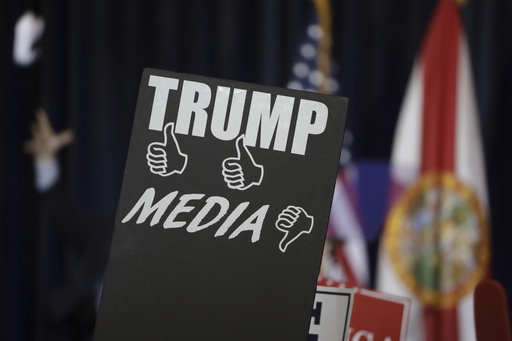NEW YORK – As the prospect of a second Trump administration looms, news organizations find themselves grappling with a delicate balance: the need to remain vigilant and prepared while managing fears regarding potential fallout. Donald Trump, who has frequently labeled journalists as enemies and hinted at revenge against those he believes have wronged him, leaves media executives with numerous concerns. These include threats of litigation, attempts to expose confidential sources, potential physical threats, and ongoing attacks on both public media and the core protections against defamation that journalists typically rely on.
In a recent widely-discussed case, ABC News opted to resolve a defamation lawsuit initiated by the president-elect by agreeing to contribute $15 million towards Trump’s presidential library, stemming from an inaccurate comment made by anchor George Stephanopoulos. “The news media is entering the next administration with clear awareness of the landscape,” remarked Bruce Brown, executive director of the Reporters Committee for Freedom of the Press. Brown emphasized that challenges to press freedom could manifest in both overt and subtle ways. “We must remain ready for quick responses, as well as long-term efforts to safeguard our rights, all while bearing in mind that our primary audiences are the courts and the public,” he stated.
One editor, however, cautioned against an overly aggressive stance against an administration not yet in power. Stephen Engelberg, the editor-in-chief of ProPublica, suggested that while there may be concerns, it may be premature to sound alarm bells. At a press conference, Trump addressed the media landscape, emphasizing the need for a “fair media,” while highlighting ongoing legal disputes he has with various news organizations. He remarked, “We have to straighten out the press. Our press is very corrupt, almost as corrupt as our elections.”
As Trump re-enters the political scene, news organizations face challenges, both financially and in terms of reputation among the public. During his previous campaign, Trump often bypassed traditional media outlets in favor of podcasts but still took the time to target specific outlets such as ABC, CBS, and NBC. His supporters typically harbor a disdain for critical journalism, which can be politically advantageous for Trump and his allies. Instances surrounding the nomination of Pete Hegseth for defense secretary exemplified how standard reporting processes can be misconstrued as attacks. In one case, the New York Times reached out to Hegseth’s mother regarding a critical email she had sent him, but she later claimed that the inquiry felt threatening, despite it allowing the newspaper to report her subsequent apology.
Furthermore, Hegseth accused ProPublica of attempting to publish false information regarding his acceptance into West Point, a claim made in response to officials contradicting his assertions. Despite ProPublica never releasing a story on the matter after he provided evidence refuting the claim, narratives of a supposed smear campaign took hold, as reflected in headlines from various publications.
Trump’s previous administration saw friction with the media escalate, evidenced by his lawsuits against CBS News for how it edited an interview with Kamala Harris and pressure on ABC News over fact-checking during a debate. He also criticized the Des Moines Register for a poll that suggested he was trailing Harris. Trump anticipates filing a lawsuit against the publication, claiming the poll constituted “fraud and election interference,” though the Register maintains the integrity of its reporting.
As he re-engages with mainstream media, including interviews and press conferences, particular concern arises regarding the environment under which journalists operate, primarily due to Trump’s appointments. His selection of Kash Patel as FBI head raised eyebrows after Patel openly stated that the media would be targeted for “lying about American citizens.” Additionally, other appointments, like Brendan Carr and Kari Lake, have also exhibited animosity toward media practices, which places journalists’ work at risk.
Moreover, there are worries that policies protecting journalists from having their records seized may be reconsidered under the new administration. The Reporters Committee is already cautioning journalists about safeguarding their materials, with ProPublica’s Engelberg urging, “If you have something you don’t want to share with a broader audience, don’t put it on the cloud.”
Instances from Trump’s previous term included journalists covering immigration being subjected to questioning and scrutiny, raising the possibility that this could reoccur, especially regarding deportation coverage. PEN America expresses concern about the dual dangers of physical threats and digital harassment journalists may face. A troubling comment from Trump at a rally indicated the potential for violence against the press, punctuating a need for responsible leadership to de-escalate aggression towards journalists.
Legislative moves, such as Senator John Kennedy’s bill aiming to halt taxpayer funding for public broadcasting, reflect broader Republican goals since Trump returned to power. Additionally, some Supreme Court justices are eager to reassess legal precedents related to media defamation, hinting at potential challenges ahead for news organizations.
In summary, it is evident that a renewed Trump administration may pose substantial challenges for press freedom, according to former Washington Post editor Martin Baron, who articulated that Trump would utilize every mechanism available to him in his pursuit of control over the media landscape.
Reflections from the media landscape in Hungary intertwine pessimism with a faint glimmer of hope. Observers note that following Viktor Orban’s rise to power in 2010, media has largely transformed into a propaganda extension of the government. Investigative journalist Andras Petho, who faced pressure at a news site due to government influence, suggests that despite repression, independent journalism still holds prospects in Hungary, as proven by recent official resignations following scandal revelations. Petho advises journalists to focus on their work without framing themselves as a resistance, which could be counterproductive.
He recognizes a decline in the perceived power of the media, yet he maintains that the value of journalism should not be underestimated, urging journalists to remain steadfast in their commitment to uncovering and presenting the truth, even in challenging environments.




